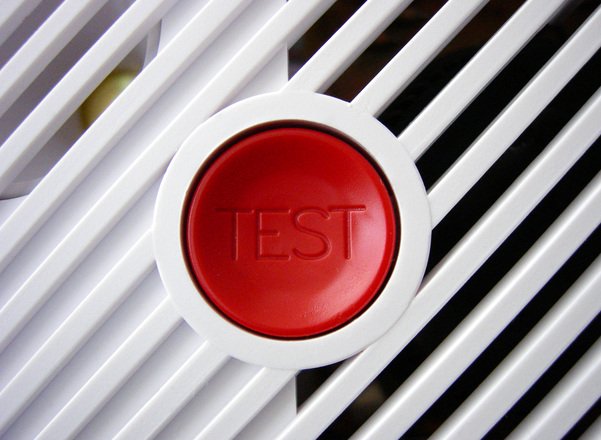Long Island, NY - March 11th, 2016 - Spring is just around the corner, and one sure sign is the start of Daylight Saving Time. This coming weekend, we’ll “spring forward” by turning clocks ahead one hour. It’s also an ideal time to spring into action for home safety, by changing the batteries in our carbon monoxide alarms.
“The safety of our customers is the top priority for National Grid,” said Ken Daly, President, of National Grid in New York. “Take proper safety precautions now to make sure you and your family are safe from the potentially deadly effects of carbon monoxide poisoning.”
Carbon monoxide (CO) is an invisible, odorless gas that can be deadly if left undetected. When fuels such as natural gas, butane, propane, wood, coal, heating oil, kerosene, and gasoline don’t burn completely, they can release carbon monoxide into the air. Common sources of carbon monoxide include malfunctioning forced-air furnaces, kerosene space heaters, natural gas ranges, wood stoves, water heaters, fireplaces and motor vehicle engines.
The symptoms of carbon monoxide poisoning are similar to those of the flu. Depending on the amount of carbon monoxide in the air and length of exposure, symptoms may include headaches, weakness, confusion, chest tightness, skin redness, dizziness, nausea, sleepiness, fluttering of the heart or loss of muscle control.
If you suspect carbon monoxide is present in your home, go outside immediately and call 911. Next, call National Grid’s gas emergency contact number 718-643-4050 for Brooklyn, Queens and Staten Island and 1-800-490-0045 for Long Island/Rockaway Peninsula. Do not return to your home until the carbon monoxide source is found.
National Grid shares the following safety reminders with its customers to help identify and prevent carbon monoxide poisoning:
-
Install Underwriters Laboratory (UL) approved home carbon monoxide detectors on every floor of your home. Follow the manufacturer’s instructions for placement and mounting height.
-
Check chimneys or flues for debris, bird nests or other blockages, and have them cleaned periodically.
-
Be sure space heaters and wood stoves are in good condition, have adequate ventilation and are used in strict compliance with the manufacturer’s instructions.
-
Never use a gas range for heating or burn coal or charcoal in an enclosed space.
-
Never cover slots or holes in the bottom of the oven with spill pans or foil, which can block airflow in the oven.
-
If you use a back-up generator to supply power during an outage, be sure to operate it outdoors.
- Know that open windows do not provide sufficient ventilation to safely operate a generator indoors.
National Grid will respond immediately to all carbon-monoxide related calls for all natural gas customers within its service area – even if you purchase natural gas from an alternative gas supplier or marketer. However, please always call 911 first.
More ways to spring into action for home safety:
-
Confirm that you have working smoke detectors in every bedroom to ensure you “hear the beep where you sleep” in the event of a fire. Spring into action and replace the batteries.
-
Inspect fire extinguishers at least once a month, ensure that: the extinguisher is not blocked by equipment, coats or other objects that could interfere with access in an emergency; the pressure is at the recommended level; the nozzle or other parts are not hindered in any way; the pin and tamper seal (if it has one) are intact; and there are no dents, leaks, rust, chemical deposits and/or other signs of abuse/wear. If you don’t currently have a fire extinguisher, get one. Base your selection on the classification and the extinguisher’s compatibility with the items you wish to protect.
-
If you smell gas, (the odor is similar to rotten eggs), make sure everyone in the home leaves immediately. Once you’re safe, call 911 or National Grid at 718-643-4050 for Brooklyn, Queens and Staten Island and 1-800-490-0045 for Long Island/Rockaway Peninsula right away. Don’t light a match or smoke, turn appliances on or off (including flashlights), use a telephone or start a car. Doing so can produce sparks that might cause the gas to ignite. Remember: Smell gas. Act fast.
- Always dial 811 two to ten days before digging or excavating on your property. After you call, utility companies will mark the approximate locations of their lines at no charge to you. Whether you’re planting a shrub or installing a deck, every job requires a call to 811 – it’s the law.
Click here for National Grid’s Carbon Monoxide safety brochure. For more information on carbon monoxide prevention visit the U.S. Consumer Product Safety Division.
About National Grid
National Grid (LSE: NG; NYSE: NGG) is an electricity and natural gas delivery company that connects nearly 7 million customers to vital energy sources through its networks in New York, Massachusetts and Rhode Island. It is the largest distributor of natural gas in the Northeast. National Grid also operates the systems that deliver gas and electricity across Great Britain.
Through its U.S. Connect21 strategy, National Grid is transforming its electricity and natural gas networks to support the 21st century digital economy with smarter, cleaner, and more resilient energy solutions. Connect21 is vital to our communities' long-term economic and environmental health and aligns with regulatory initiatives in New York (REV: Reforming the Energy Vision) and Massachusetts (Grid Modernization).
For more information please visit their website.










